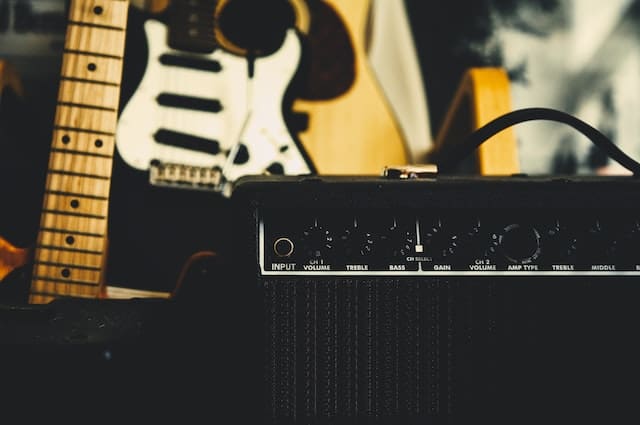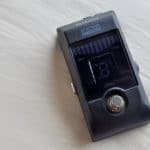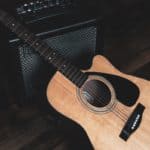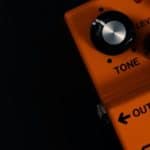What would we do without guitar amps? After all, they make a significant difference between playing and playing loud!
An electric guitar is almost useless if you’re lacking an amplifier. Sure, you may still learn how to play with it, and hear your music if you’re playing in your room.
However, forget about playing an unplugged electric guitar for studio recordings and live performances. Forget about it!
Oh, sure, but what about acoustic amps? Indeed, there’s a big differentiation between an electric and an acoustic guitar amp.
As the name implies, once is designed to work with electric guitars, and the other with acoustic ones.
But, is it as rigid as it sounds? Could you, hypothetically, play electric guitar with an acoustic guitar amp?
Although you can play electric guitar through an acoustic guitar amp, we encourage you not to try this combination. Neither the amp nor the guitar will be hurt in any way. However, the sound coming from this hybrid is too boring. Electric guitar amps not only amplify but also color the signal.
Okay, you’ve got the main idea. But what if, despite all odds, you still want to give this combination a try?
What can you expect from this experiment?
The answers to that (and much more!) are waiting for you below.
What’s the main difference between an acoustic and an electric guitar amp?
The main difference between acoustic and electric amps relies on the way they amplify the signal coming from the instrument.
To explain this more precisely, let’s focus on each amplifier.
Guitar amps amplify the signal of the electric guitar by giving it more volume and gain, as well as “voicing” or “coloring” the signal.
On the contrary, an acoustic guitar amp is designed to deal with cleaner and clearer signals.
Let’s explain this in other words.
When we play with a disconnected electric guitar, we can hear the notes that we pluck.
However, the sound coming out of the instrument will be faint, dry, and weak. Long story short, it sounds “lifeless.”
Now, everything changes when we connect the electric guitar to an electric guitar amp. The amplifier drastically interferes with the way the guitar sounds.
Even if you gain-stack a wide set of pedal effects, the sound that you’ll produce will be a result of the electric guitar amp.
So, we could claim that the electric guitar amp plays a major role in the electric guitar’s sound. Without it, an electric guitar will lack feeling.
This, however, works differently for acoustic amps. The job of an acoustic guitar amp is simply to “amplify” the sound of the acoustic instrument.
It literally boosts the volume that you can produce with an acoustic guitar. Thus, the acoustic amp will make your guitar sound louder, without adding too much of a difference regarding tone and effects.
This kind of amplification is often called “transparent” or “hi-fi”
Some guitarists could prefer having some reverb or any other change of setting when playing with an acoustic guitar and an acoustic guitar amp. But most often than not, the acoustic amplifier will do nothing but “strengthen” the guitar’s sound.
Can you damage an acoustic guitar amp if you use it with an electric?
An acoustic amp won’t get damaged if you play with an electric guitar. All in all, you can play safely that way, knowing that the acoustic guitar amp will remain in good condition.
Consider that an acoustic guitar amp works almost like a PA system. That means that the electric guitar cannot damage the acoustic amp at all.
However, you’ll see that it’s not the best choice regarding sound. We’ll discuss more of it later in this article.
In the meantime, let’s find out if the electric guitar gets any damage one way or another.
Can you damage an electric guitar if you use it with an acoustic amp?
Just like in the previous case, it’s safe as a house to play electric guitar on an acoustic amplifier.
The electric guitar won’t face any problem whatsoever, neither short nor long term.
But once again, we have to warn you about the inefficiency of its sound. Let’s find out why.
How would an electric guitar sound through an acoustic amp?
The combination of electric guitar + acoustic guitar amp is not the best one in this world.
Even when electric guitars are played clean, electric guitar amps distort their signal in a particular way. This is what’s called an amp’s voicing.
Contrary to hi-fi amplifiers, electric guitar amps don’t seek fidelity, but a particular tone that we all agree on.
This feature is immediately acquired with any standard electric guitar amplifier.
The acoustic guitar amp works differently. It only provides a clean sound, with little to no distortion at all.
Clean tones with an electric guitar in an acoustic amp could work just fine, as long as you play it just for the sake of it. Not to mention, you could achieve interesting results if you’re willing to experiment when composing and recording.
However, you will always be lacking that edge that dedicated electric guitar amps give you, and you will sound somewhat duller.
In the case of live performances, we encourage you to avoid this mixing if possible.
Is there any way of getting good tones with an acoustic amp?
You could get by with an electric guitar and an acoustic amp if you carry with you a set of effect pedals or a multi-effect digital processor.
Consider that this approach is the same as plugging your multi-effects pedal into a PA system. However, if you lack a PA system but do have an acoustic amp at hand, then go for it.
Other than that, you’ll get nothing but unwanted sounds. If you use a distortion pedal with an electric guitar and an acoustic amp, for example, you’ll find that the amp starts to clip.
Not to mention, the hi-fi properties of the acoustic amps don’t suit the distortion pedal harmonies.
So, stick to your PA system instead, and work with an acoustic guitar amp if there are no alternatives at all.

Hello there, my name is Ramiro and I’ve been playing guitar for almost 20 years. I’m obsessed with everything gear-related and I thought it might be worth sharing it. From guitars, pedals, amps, and synths to studio gear and production tips, I hope you find what I post here useful, and I’ll try my best to keep it entertaining also.





